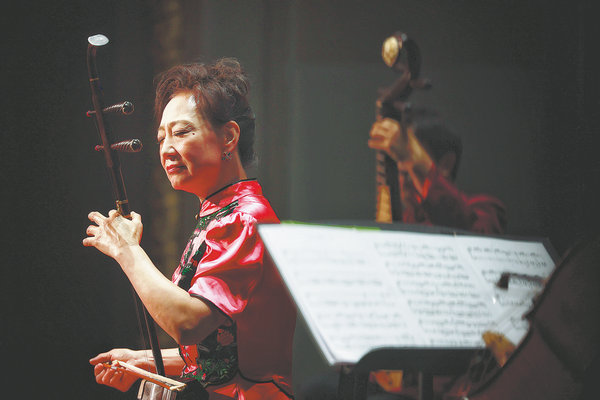

Erhu musician Jiang Jianhua spoke of her passion for her city of Shanghai during a concert on Oct 26.
Invited by the China Shanghai International Arts Festival, Jiang presented a concert named after her award-winning album Hometown Passion. This features familiar erhu repertoire, the theme song of the 1987 film The Last Emperor composed by Japanese musician Ryuichi Sakamoto, as well as her own erhu adaptations of classical pieces such as Vittorio Monti's Czardas and Pablo Sarasate's Carmen Concert Fantasy.
On Oct 31 she took part in an outdoor performance with the Macao Orchestra at the 2023 Shenzhen Belt and Road Music Festival in Guangdong province. She is to collaborate with the Nie Er Symphony Orchestra at a concert in Kunming of Yunnan province on Friday.
Back in 1978, when Jiang was a student at the Central Conservatory of Music in Beijing, she played Erquan Yingyue, or "Moonlight on the Pond", a much beloved erhu piece, for visiting Japanese conductor Seiji Ozawa. The maestro conductor was so moved by her performance that he wept and said it is "a music piece that should be listened to while kneeling".
Ozawa later invited Jiang to study in Japan and introduce the Chinese stringed instrument to audiences in Japan and further afield.
Jiang has since been living in Japan, performing internationally and teaching erhu. She once played as a soloist at the Tanglewood Music Festival with renowned symphony orchestras from Boston and San Francisco.
Jiang was the first Chinese musician to perform at the Suntory Hall in Japan when she played with the New Japan Philharmonic under the baton of Ozawa at the venue's inaugural concert in 1986.
That same year, she participated in recording the soundtrack for The Last Emperor, playing the music by Japanese composer Sakamoto. Given the fact that Sakamoto was a major public figure in Japan, the movie garnered much attention and helped raise interest in the erhu. Jiang was later invited to become a special professor at an art college in the Gunma Prefecture which offered the first erhu major in Japan.
In 1989, she performed The Shadow of Wind, an erhu concerto composed specially for her by Kei Anjo, accompanied by the Berlin Philharmonic.
In 2003, her album Hometown Passion won the special prize at the 17th Gold Disc Award of Japan.
In 2007, she returned to China and started teaching at the Central Conservatory of Music in Beijing. Today she considers cultivating young musicians and finding new possibilities for the traditional instrument as her life's mission.
The erhu is a bowed Chinese fiddle with two strings. Since it was first appeared in China during the Tang Dynasty (618-907), the instrument has become one of the most widely used in Chinese folk music.
With only two strings and no fingerboard, the erhu is a difficult instrument to play, but capable of rich emotional expressions, says Jiang, adding that playing foreign compositions on the erhu is challenging, and is almost like teaching the instrument to speak a different language.